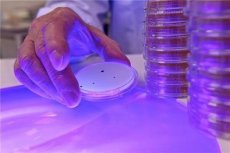Medical expert of the article
New publications
Next-generation vaccination: eliminating needle use
Last reviewed: 01.07.2025

All iLive content is medically reviewed or fact checked to ensure as much factual accuracy as possible.
We have strict sourcing guidelines and only link to reputable media sites, academic research institutions and, whenever possible, medically peer reviewed studies. Note that the numbers in parentheses ([1], [2], etc.) are clickable links to these studies.
If you feel that any of our content is inaccurate, out-of-date, or otherwise questionable, please select it and press Ctrl + Enter.

British scientists from London's Royal Holloway University have developed a unique method of oral vaccination that can increase the body's defenses against tuberculosis, as well as Clostridium difficile, a type of bacteria that causes pseudomembranous colitis, a severe infectious disease of the rectum that occurs as a result of the destruction of intestinal microflora due to the use of antibiotics.
According to scientists, last year this infection caused the death of more than four thousand people, and in total there are about 50 thousand infected people. The mortality rate from this infection is higher than from Staphylococcus aureus.
The vaccine was developed by Professor Simon Cutting.
Clinical tests show that a new vaccine taken as a pill provides strong protection against Clostridium difficile.
Clostridium difficile poses a serious danger to elderly and very young patients whose immune systems are weakened and susceptible to viral attacks.
“There is currently no effective vaccine against this pathogen, and although new drugs are currently being tested, none of them guarantee complete protection against infection,” the professor comments.
Professor Cutting combined Clostridium difficile and spores of bacteria that live in the human gastrointestinal tract. The specialists Bacillus subtilis by introducing Clostridium difficile. As a result, key parts of the pathogen floated to the surface of the pores. The spores carried pathogenic particles through the intestinal wall, causing an immune response that will protect the body in the future. Similar technology can be used to vaccinate against flu and tuberculosis, only in the form of a nasal spray.
The scientist plans to test the new vaccine on people in the near future.
"A bacterial-based vaccine offers additional advantages over other treatment approaches because oral administration of the drug is more effective against Clostridium difficile," says the study's author.

